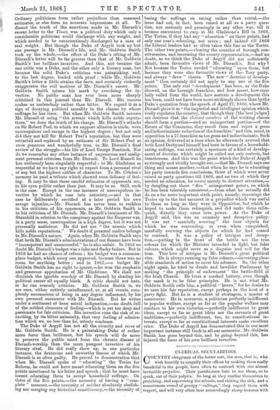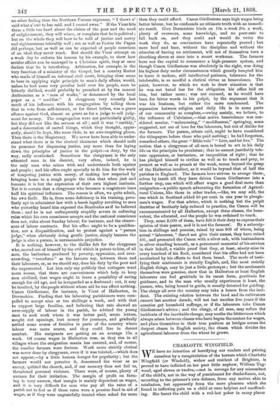CLERICAL SECULARITIES.
COUNTRY clergymen of the better sort, the men, that is, who wish heartily to magnify their offices by making them really beneficial to the people, have often to contend with one almost invincible prejudice. Their parishioners hate to see them, so to speak, out of their pulpits. So long as they confine themselves to preaching, and supervising the schools, and visiting the sick, and a monotonous round of gossipy " callings," they regard them with respect, and will very often bear astoundingly sharp lectures with
no other feeling than the Northern Farmer expresses, "I thowt a' said what a' owt to hae said, and I coomd awaa." If the Vicar hits them a little too hard about the claims of the poor and the need of enlightenment, they will wince, or complain that he is political ; but on the whole they will bear to be told of justice and mercy and righteousness tolerably well ; not as well as Festus the Pagan did perhaps, but as well as can be expected of people conscious of an ideal they never reach. But should the Vicar attempt on a week day to enforce his lessons by his example, to show how secular affairs can be managed in a Christian spirit, they at once declare that he is interfering. Arbitration, for example, is the very function of a minister of the Gospel, but a country Rector who made of himself an informal civil court, bringing clear sense to bear in applying right principle to men's daily affairs, would, unless he had some very peculiar hold over his people, soon be bitterly disliked, would probably be preached at by the nearest Antinomian as a " man of works," or denounced by the local paper as a " meddler." A clergyman very recently lost much of his influence with his congregation by telling them that to vote from self-interest, or for direct bribes, was a grave offence against God, almost as grave as for a judge to sell judg- ment for money. The congregation were not particularly guilty, but they did not like the sermon at all ; said it was " earthly," and a desecration of sacred things, which they thought, appar- ently, should be kept, like some idols, in an awe-inspiring gloom. Then there is the Magistracy. We never have been able to under- stand what there is in the clerical character which should unfit its possessor for dispensing justice, any more than for laying down the principles of justice in the pulpit—a duty, by the way, sadly overlooked. Sometimes the clergyman is the only educated man in his district, very often, indeed, he is the only man who mixes with and understands both squires and people ; and his office ought specially to fit him for the work of tempering justice with mercy, of making law respected by bringing home to a rough people the idea that when just and humane it is but the expression of their own highest instincts. Yet it is certain that a clergyman who becomes a magistrate loses half his spiritual influence. The reason is often, we quite admit, his own fault. He is, from some deficiency in his training, pecu- liarly apt to administer law with a harsh legality revolting to men who yesterday heard him expound the Beatitudes as if he believed them ; and he is not unfrequently stupidly severe in enforcing rules which his own conscience accepts and the national conscience does not, rules about Sunday labour, for instance, and the observ- ance of labour contracts. But his office ought to be a qualifica- tion, not a disqualification, and to protest against a " parson judge," when obviously doing gentle justice, simply because the judge is also a parson, is unreasonable prejudice.
It is nothing, however, to the dislike felt for the clergyman who, moved out of himself by the evil which is patent to him, of all men, the barbarism produced by poverty, oppression, and over- crowding, " interferes " as the farmers say, between them and their labourers, or, as we should say, does his duty by the poor and the unprotected. Let him only say publicly that cottagers want more rooms, that there are conveniences which help to keep men civilized, that wages ought to leave a possibility of saving enough for old age, and he is regarded as a firebrand ; cut, it may be insulted, by the people without whose aid he can effect nothing. Canon Girdlestone, fOr instance, is Vicar of Halberton, in Devonshire. Finding that his labouring parishioners were com- pelled to accept nine or ten shillings a week, and with that to support large families, and • believing that rate showed an over-supply of labour in the parish, he advised the young men to seek work where it was better paid, wrote letters, sought out openings, lent money for journeys, and gradually settled some scores of families in parts of the country where labour was more scarce, and they could live in decent comfort. His emigrants are getting on an average 15s. a week. Of course wages in Halberton rose, as they rise in all villages where the emigration mania has entered, and, of course, the smaller farmers were furious. Work more strictly clerical was never done by clergyman, even if it was tainted,—which does not appear,—by a little human hunger for popularity ; but the farmers would not perceive it, denounced the vicar as an enemy, quitted the church, and, if our memory does not fail us, threatened personal violence. There were, of course, plenty of excuses for their irritation. The margin of profit on farm- ing is very narrow, that margin is mainly dependent on wages, and it is very difficult for men who pay all the rates of a parish not to feel as if those rates were a pension fund in aid of wages, as if they were ungratefully treated when asked for more than they could afford. Canon Girdlestone says high wages bring better labour, but he confounds an ultimate truth with an immedi- ate result. Give Dorsetshire hinds on 10s. a week 20s. a week, plenty of overseers, some knowledge, and no poor-rate to fall back on, and they could and would do twice the work they do, as contractors have repeatedly proved ; but mere beef and beer, without the discipline and without the stimulus of having no settlement, will not of themselves turn a slouching sloven at once into a smart workman. The farmers have not the capital to commence a high-pressure system, and though Canon Girdlestone was absolutely in the right, was doing his highest duty under circumstances which greatly tempted him to leave it undone, still intellectual patience, tolerance for the intolerable, is as needful a clerical virtue as benevolence. The point, however, to which we wish to draw attention is that he was not hated leas for the obligation his office laid on him, but rather more ; was not excused, as he would have been for bitter words in his pulpit, by the argument that it was his business, but rather the more condemned. The separation between religion and daily life is in some parts of our community so complete,—owing mainly, we believe, to the influence of Calvinism,—that active benevolence was con- sidered secular, " unbecoming," " meddlesome," springing, some suggested, not out of love for the labourers, but out of dislike for the farmers. The parson, others said, ought to have considered the tithepayers before those who paid nothing ; he had forgotten, remarked others, the great " Bible rule " " Live, and let live." The notion that a clergyman of all men is bound to act in his daily life on the principles he proclaims ; that he cannot justifiably tole- rate oppression, or barbarism, or inequalities of right ; that he has pledged himself to civilize as well as to teach and pray, to protect as well as to preach at the weak, seems beyond the grasp of the Halberton intellect, as it would be beyond that of half the parishes in England. The farmers have striven to avenge them- selves by insult till they have driven Canon Girdlestone into a further step, one which will affect wages a good deal more than emigration—a public speech advocating the formation of Agricul- tural Unions, like those in other trades,—like, we may add, the one which in Scotland added 50 per cent. in one year to plough- men's wages. For that advice, which is nothing but the pulpit doctrine of brotherly help reduced to practice, the Canon will be excommunicated by all Halberton, except three classes, the bene- volent, the educated, and the people he was ordained to teach.
They, some 2,000 of them, have felt it their duty to express their opinion of their pastor, and it is not the farmers'. By a subscrip- tion in shillings and pennies, raised by men 900 of whom, being actual "labourers, " dared not give their names, they have raised 401., and presented the Canon with a silver oak, with husbaudmen in silver standing beneath, as a permanent memorial of his services in their behalf, a visible proof that they, at least, ninety-nine in every hundred of his flock, considered that his office had not been secularized by his efforts to find them bread. The mode of testi- fying their sentiments is strictly English, and, like most strictly English things, may be just a little grotesque ; but the sentiments themselves were genuine, show that in Halberton at least English labourers can feel gratitude in its rarest form, gratitude for guidance, and to the man who usually experiences it least, the parson, who, being bound to guide, is usually detested for guiding. The clergy all over the country may take a lesson from the inci- dent. The existing relation between the land and its cultivators cannot last another decade, will not last another five years if the counties get household suffrage, or if the labourers take Canon Girdlestone's advice ; and the clergy, of all men, may soften the incidents of the inevitable change, may soothe the bittterness which always arises between classes who have begun the contest for wages, and place themselves in their true position as bridges across the deepest chasm in English society, the chasm which divides the agricultural labourer from the wheat he grows.































 Previous page
Previous page